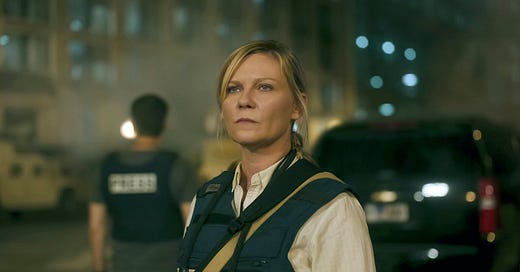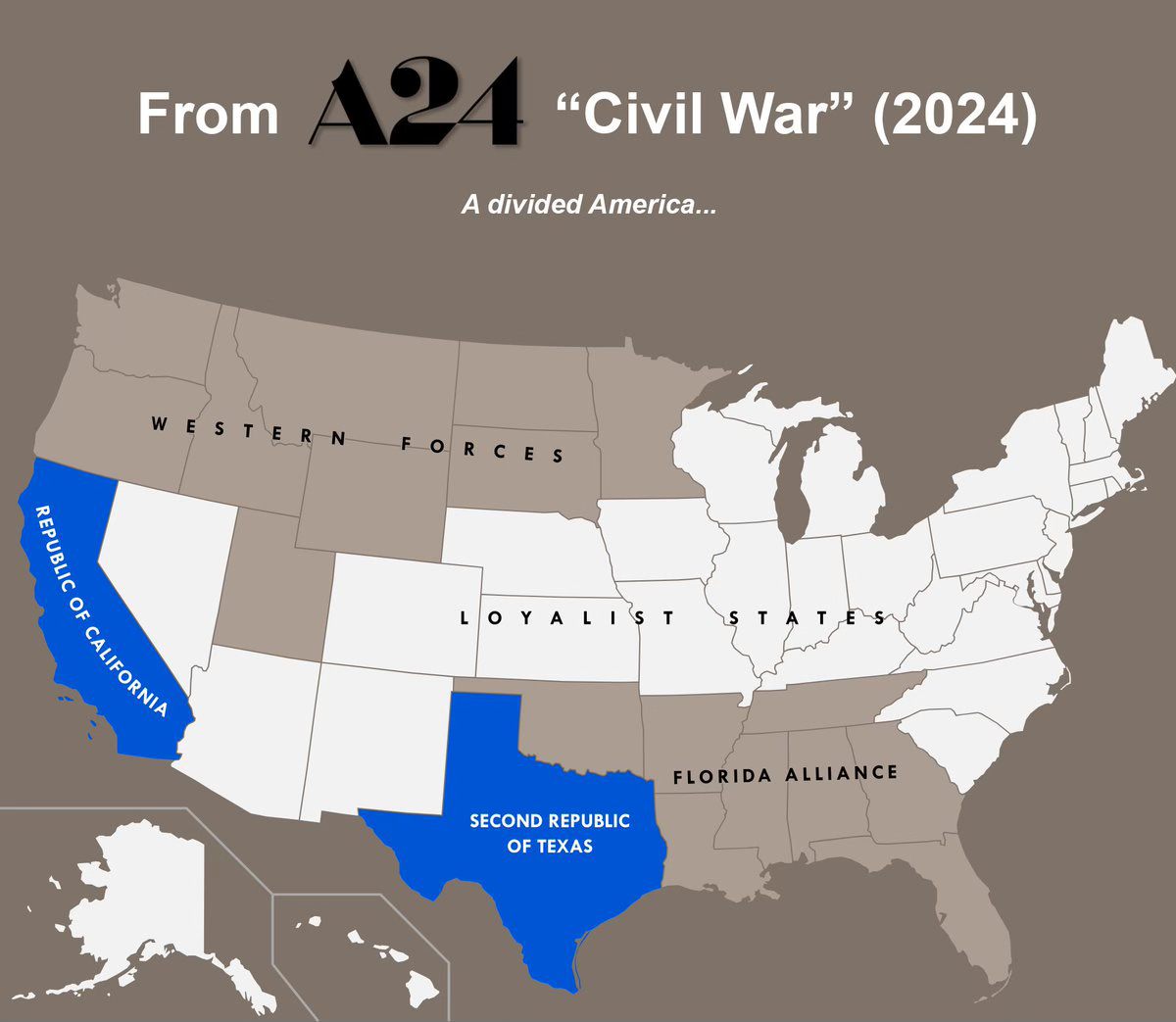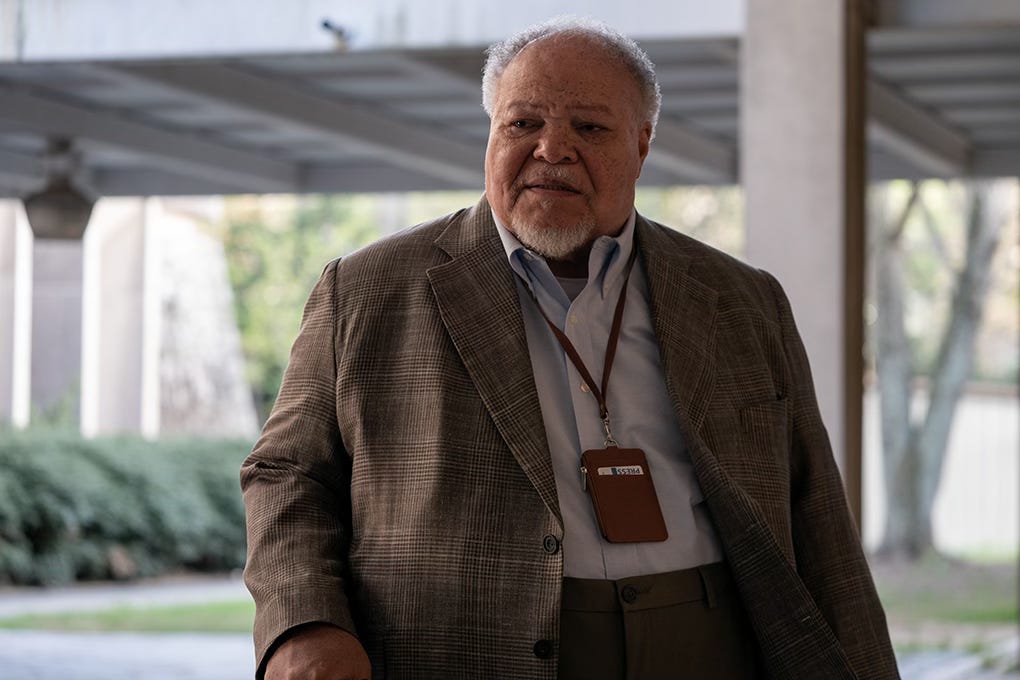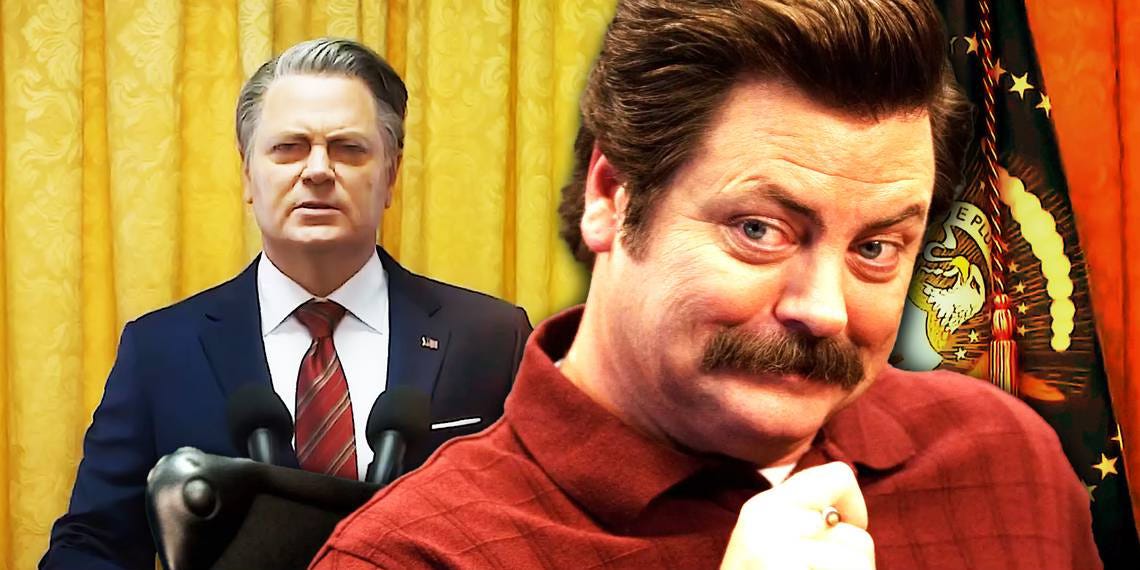Civil War (2024)
The new A24 film hits all the right notes. Not escapism - it's hyper-realism, & the best movie possible about a necessarily treacherous subject.
Very uncharacteristically, my wife, who tends to prefer comedies (typically British ones) and escapist fantasy films - and typically abhors horror and gritty thrillers, agreed to see Civil War, written and directed by Alex Garland (directorial credits include one of A24’s earlier films, the 2014 Ex Machina, and the extremely creepy 2018 film Annihilation).
So we saw it - and I left the movie theater with my wife spent. We did not talk on the entire drive home… and we’ve been talking about the movie on and off for the rest of the week.
I am an unabashed fan of A24’s offerings - I personally consider it one of the most innovative, risk-taking and fearless independent movie production shops I’ve seen in many years.
Some notable favorites of mine from A24:
Hereditary (2018). As a grown adult, very little scares me anymore, but this film, director Ari Aster’s feature film debut, was one of the first in a long time that truly left me feeling deeply unsettled in a way that a truly quality horror movie can (as an aside, the only other movie that did this for me was William Friedkin’s deeply scary ‘psychological horror’ film, the 2006 movie “Bug”).
Everything, Everywhere All At Once (2022). Some people really didn’t like this film and thought it was too bizarre, too odd, too nerve-jangling, but I thought it was ridiculously original and thought provoking, while at the same time so action packed you couldn’t keep your attention off the screen. Michelle Yeoh rocked this one, as well.
Midsommar (2019). Much like Ari Aster’s first film, Hereditary, Midsommar is a deeply psychological horror film that, instead of demonic possession as a backdrop to exploring the pathologies and breakdown of a family, it uses the backdrop of a violent cult in, of all places, rural Sweden as a method of exploring the breakdown between a young college couple.
Saint Maud (2019). This is a British release from A24, and didn’t get much play / distribution in the United States I suspect, and I only stumbled across it. It has much in common with the two Ari Aster films, above (particularly Hereditary) - deeply psychological, disturbing, with an unforgettable ending.
With that, let’s get the brief synopsis and my take on A24’s newest, broadly, from the perspective of a veteran cinephile.
We’ll wade into the political aspects, as it were, as we go:
Civil War (2024) Review - Not Escapism by Any Means, But Extremely Effective Filmmaking
The experience of watching ‘Civil War’ is that of being virtually surrounded in a hyper-realistic view of America in the not-too-distant future that’s descended into full-scale societal dissolution and open, civil warfare and armed conflict.
Improbably (and we’ll touch on this again later) California and Texas have apparently broken off from the “loyalist states” and lead a secessionist fight for dominion over what remains of the United States.
The movie itself focuses on an ensemble cast made up of veteran war correspondents - featuring Kirsten Dunst in the lead role of Lee, a hardened war correspondent and photojournalist. Regarding Kirsten Dunst - she is fantastic. Understated, yet intense, brooding, and haunted - she does what could quite possibly be her best work in this film.
The supporting cast is solid - there’s Joel, Lee’s good-natured and hard-drinking journalist colleague (played by Brazilian actor Wagner Moura), and there’s young, aspiring journalist and tagalong Jessie (played by Cailee Spaeney), whose presence (initially an annoyance for Dunst’s character, Lee) provides a critical tension and space for the movie to develop Lee’s character further by exploring her tortured past.
Finally, there’s aging journalist of “what remains of the New York Times” played by veteran stage and film actor Stephen McKinley.
The pacing of the film is just right. The sound editing is jarring and perfect. The sets are immersive and seamless. The camerawork is kinetic, electric - but never contrived or gimmicky.
The movie soundtrack - which seemed to be drawn from a diverse selection of darkly cacophonous, dissonant psychedelia and eclectic Americana, perfectly accentuates the quiet desperation and mood of this film.
In short, I think from an overall technical perspective and from an acting perspective - this movie was nearly flawless.
Spoiled Myself by Reading Reviews Beforehand
I had read a few reviews of this movie before I watched it.
I tried to avoid most of them, but couldn’t resist, I read three. The first was from Diana Murray, who is one of my first follows on X (back when it was Twitter) and who runs a ’Stack of her own. She reviews it (and dislikes it tremendously) here, and it’s worth a read as a counterpoint (even though I ultimately disagree):
The second review I read was in Reason Magazine, which was generally laudatory:
After that, I read one more brief review and decided I had to see the film.
“Civil War” - is it a Political Movie?
Like I said, I end up much more in Suderman’s camp than Ms. Murray.
Watching ‘Civil War’ is an immersive and eerie experience, particularly as the journalist protagonists of the story travelled across the US to reach DC and document the final assault on the White House. The sound editing was stark and jarring. The sets and filmography seamlessly and convincingly did what moviemakers all shoot for - effective suspension of disbelief - and did it exceedingly well.
One of the most effective storytelling aspects of this film is one of it’s most talked-about: the fact that it assiduously avoided explaining what likely many come to the movie to learn about:
Why were they fighting?
What were their politics?
What led up to the United States descending into full-scale civil war?
I’ve heard comments that director-screenwriter Garland left these questions almost entirely vaguely defined and unanswered in this film as a deliberate choice, so as to better stage an exploration into the grim, tragic, and socially disintegrative effects of this kind of war on a nation.
I actually disagree, but only somewhat. Yes, Alex Garland, like probably 80-90% of his Hollywood colleagues, is a progressive leftist (watch this clip and decide for yourself).
It didn’t escape my notice that the choice of US President in this film - the ultimate bad guy - was played by Nick Offerman (yes, the libertarian boss character from the TV show Parks and Recreation). Or that the various “loyalist” military, along with the more violent protagonists portrayed in the film seemed to be rather…. white…. and rural.
However, - I don’t think these details are important. I think one can seize upon them, project one’s own biases and insecurities on them and make them bigger than they are.
I do think this movie was about how when societal dissolution happens to the degree it does to produce and outbreak of mass civil conflict in a country - ideology and politics cease to matter, and all that matters is survival.
A 2024 Film About a Modern US Civil War Was Made the Only Way it Could be Made
Ultimately, the movie leaves all the important details about the nature of the conflict, the politics, the ideological battles, the important historical events that may have led to this conflict unsaid - it’s all left deftly and cleverly vague and undefined, aside from a few ambiguous shadows and hints.
Let’s face it - director Alex Garlard had to make the movie this way.
I mean, think about it - the United States currently is slightly more than six months away from a general (including a Presidential) election that is likely going to be even more hall-of-mirrors ridiculous, unhinged, absurd and contentious than ever.
For anyone even slightly paying attention, in my opinion it’s uncontroversial at this point that the USA is currently already engaged in a ‘cold civil war,’ and has been since roughly around 2016, with the managerial establishment of bureaucratic government and virtually all major civil institutions (mass media, academia, etc.) engaging in an asymmetric, combined campaign of relentless lawfare, and propaganda / censorship warfare against the threat populism poses to “democracy.”1
It’s all around us.
So yeah, Garland had to make the movie with some absurd premises - Texas and California joining forces in a secessionist civil war against the loyalist US forces? Yeah, sure.
Ultimately - Civil War is a win. Jeff Tucker said it best with the third and final review I read before I went out with the wife:
For anyone not living under a rock, consult the work of journalists Matt Taibbi and Michael Shellenberger, or former State Department Deputy Assistant Secretary for International Communications and Information Policy, Mike Benz - they have all the goods on the “fifth generation warfare” being conducted on all of us. Or you could just read










